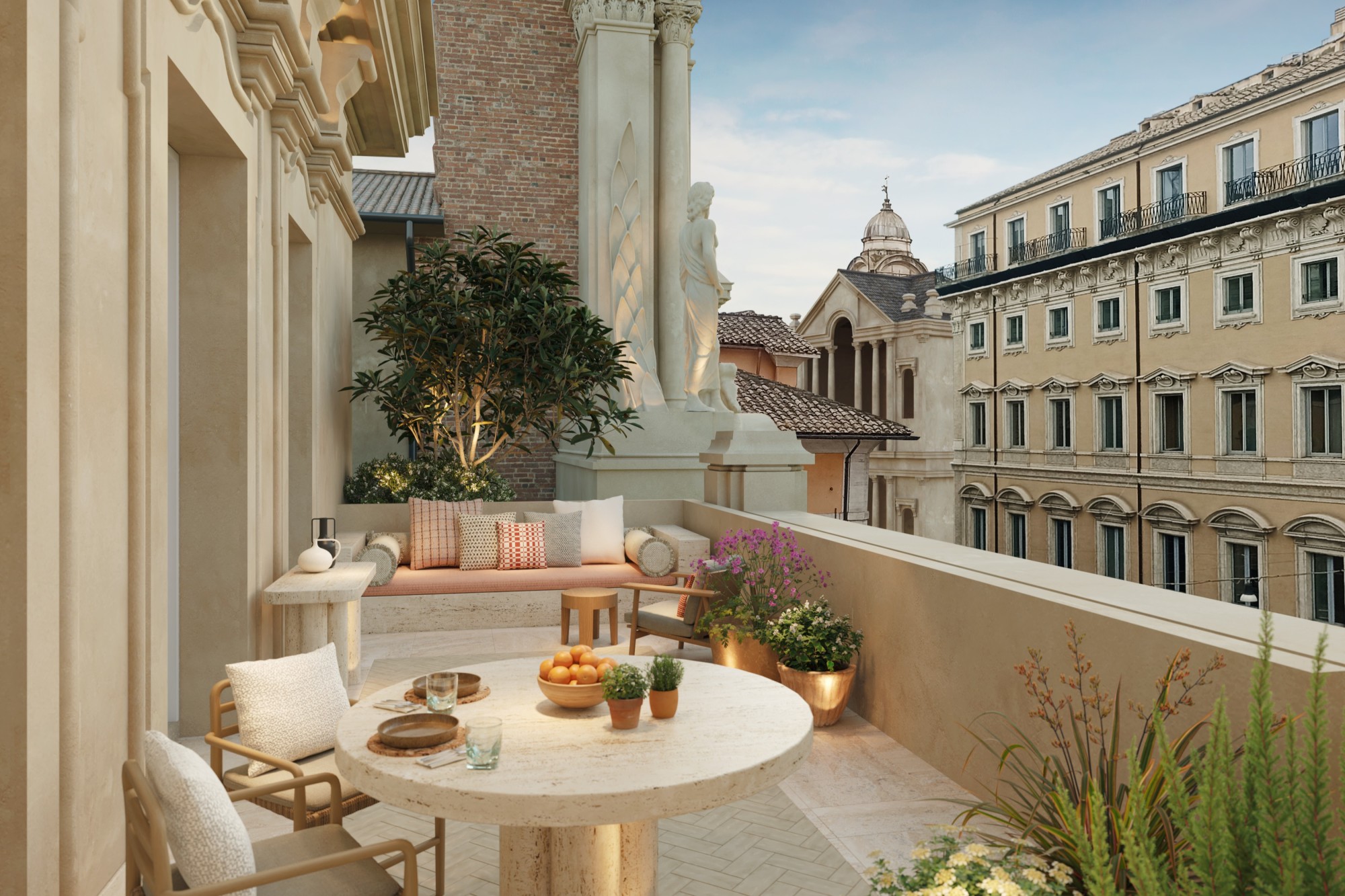
Image courtesy of Six Senses Rome
Rome is a city whose past and present are mingled on every corner. Iconic landmarks and captivating museums transport travelers back centuries, while bustling street markets and piazzas offer a lively taste of today’s culture. Italy’s capital appeals to all types of travelers, from families to couples, and its food scene is not to be missed.
At least three days is ideal to get a taste of Rome’s amazing offerings, but with a longer stay, visitors can dig a little deeper into the Eternal City’s culture. After seeing famous stops like the Vatican and the Colosseum, don’t miss more intimate experiences, like viewing Bernini sculptures in the Borghese Gallery’s mansion setting or making the climb up Janiculum Hill for breathtaking city views.
A little grittier than Florence and more cosmopolitan than the Amalfi Coast, Rome is the perfect entry point for exploring Italy, offering easy access to other regions via high-speed train. Tack on a few extra days to visit fascinating Pompeii and Vesuvius, head to the wine regions of Tuscany, or unwind with stunning views on Lake Como.
Whatever your travel style, connect with me, and I will tailor an Italian getaway just for you.
Need to know
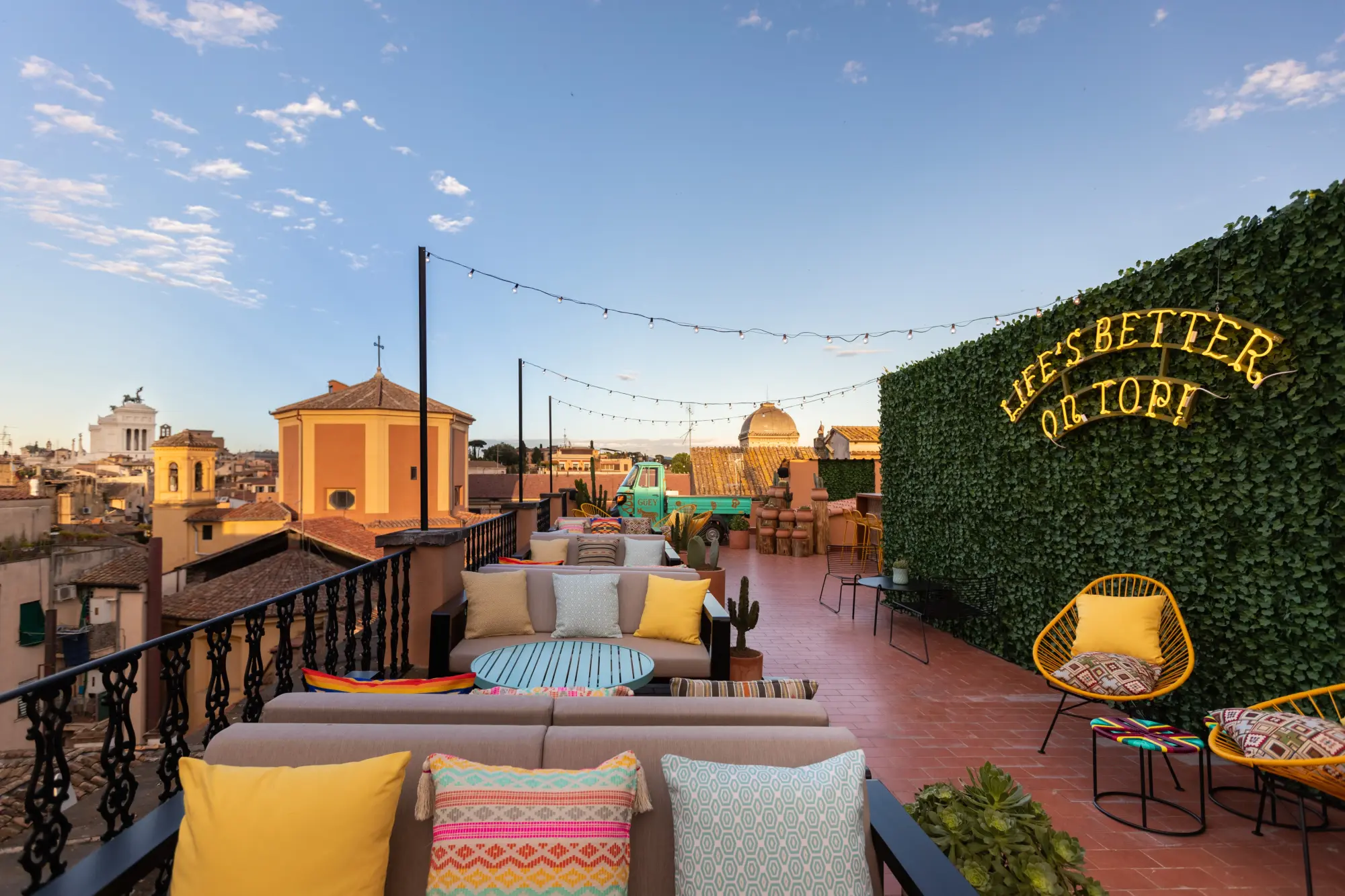
Image courtesy of Chapter Roma
Rome is equal parts historic charm and thriving metropolis. While exploring all the sights, be aware of your surroundings and pay attention to your belongings. Pick pockets are plentiful, particularly in the Roma Termini area, where travelers are often distracted looking at train schedules. Though relatively safe, it’s best to stick to the main piazzas and take a taxi or rideshare if walking a long distance in the evening.
Currency: The official currency is the Euro (€). Credit cards are widely accepted. Be sure to bring some cash for the city tourist tax, which is usually required in cash upon checkout at hotels.
Languages: Italian is the official language, but English is widely spoken and understood.
Airports: Rome Fiumicino Airport (FCO) is the main airport where international flights arrive. A train connects the airport to Roma Termini, about 30 minutes away.
Transportation: Roma Termini is the main train station and has connections to major Italian cities like Florence, Milan and Naples. The city is quite walkable in the historic center, and taxis and rideshares are also available.
Best time to visit: Rome is a year-round destination, with the most pleasant temperatures in spring (April–June) and fall (September–November). Avoid the hot summers, particularly August when much of the country is on holiday. Also avoid Easter, which is another time when business may be closed.
Ideal length of stay: Three nights in Rome is ideal to see the main sights, with up to five nights for further exploration.
Signature dishes: Must-try dishes include Cacio e Pepe pasta, Carbonara pasta and Carciofi alla Romana (Roman-style artichokes).
Key phrases: "Buongiorno" (Good morning), "Grazie" (Thank you), "Quanto costa?" (How much does it cost?).
What to wear: Comfortable walking shoes are a must on Rome’s uneven streets. Stylish, casual clothing is suitable for most days. Keep in mind that modesty (covered shoulders and knees) is important when visiting the Vatican complex or any other chapels and cathedrals. Hats are generally removed when indoors.
Where to stay
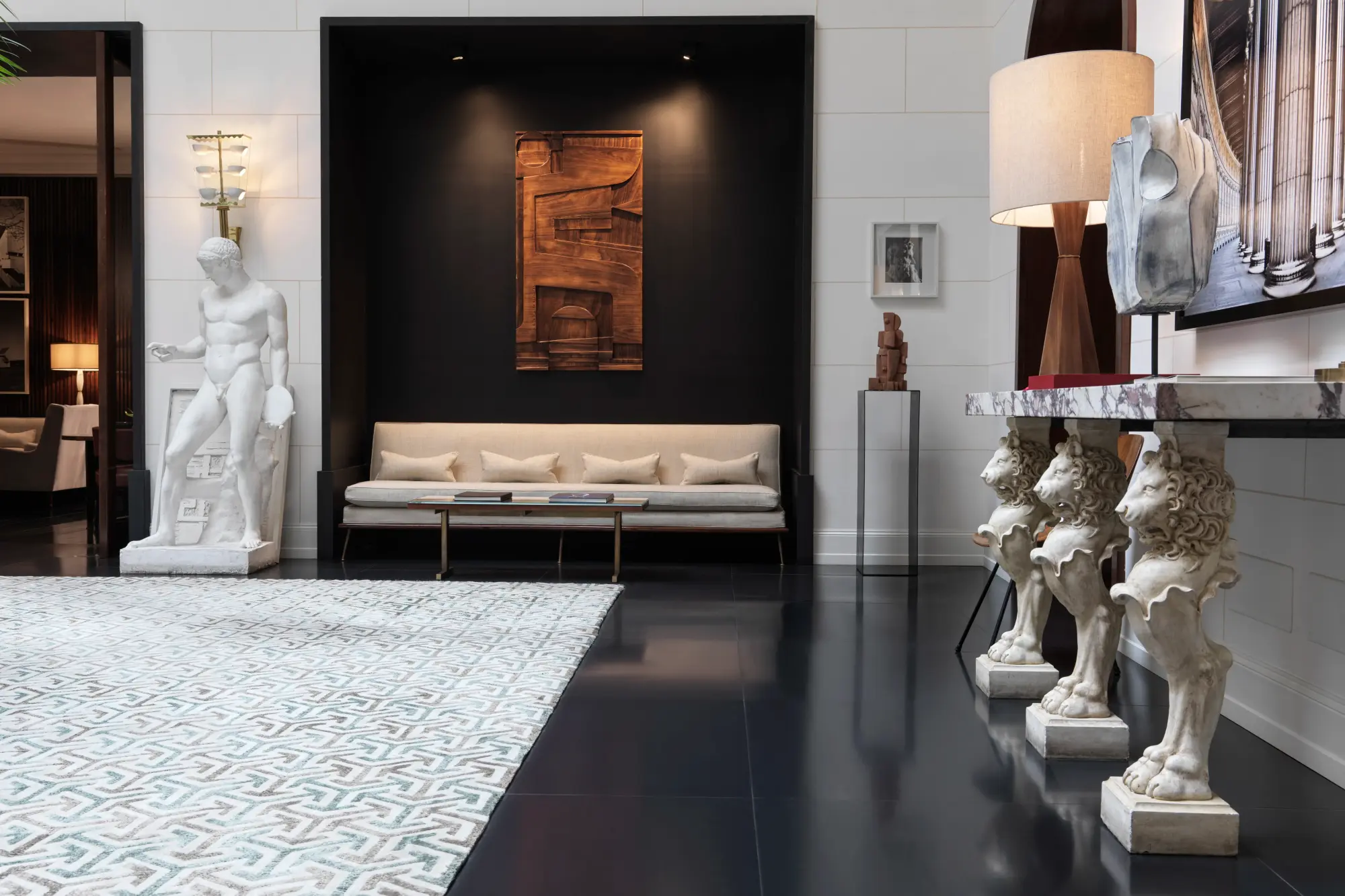
Image courtesy of J.K. Place Roma
The main neighborhoods in Rome all have distinct personalities, with some easily walkable from the city’s famous landmarks. Here is a summary of the most central neighborhoods, followed by a list of top hotels across the city.
Centro Storico: The center of Rome, where you’ll find iconic sites like the Trevi Fountain, Pantheon and Piazza Navona. It's perfect as a home base, though hotel prices may be higher here.
Vatican City & Prati: Home to St. Peter’s Basilica and the Vatican Museums, this area also includes Prati, an elegant neighborhood with excellent shopping and dining.
Trastevere: Known for its charming, cobblestone streets and lively nightlife, Trastevere offers a more authentic Roman experience with artisan shops and local eateries.
Monti: A trendy neighborhood near the Colosseum, Monti blends ancient history with a bohemian vibe, featuring vintage boutiques and hip cafés.
Testaccio: Famous for its authentic Roman cuisine, Testaccio is the city's food district, offering a lively food market and a strong local atmosphere.
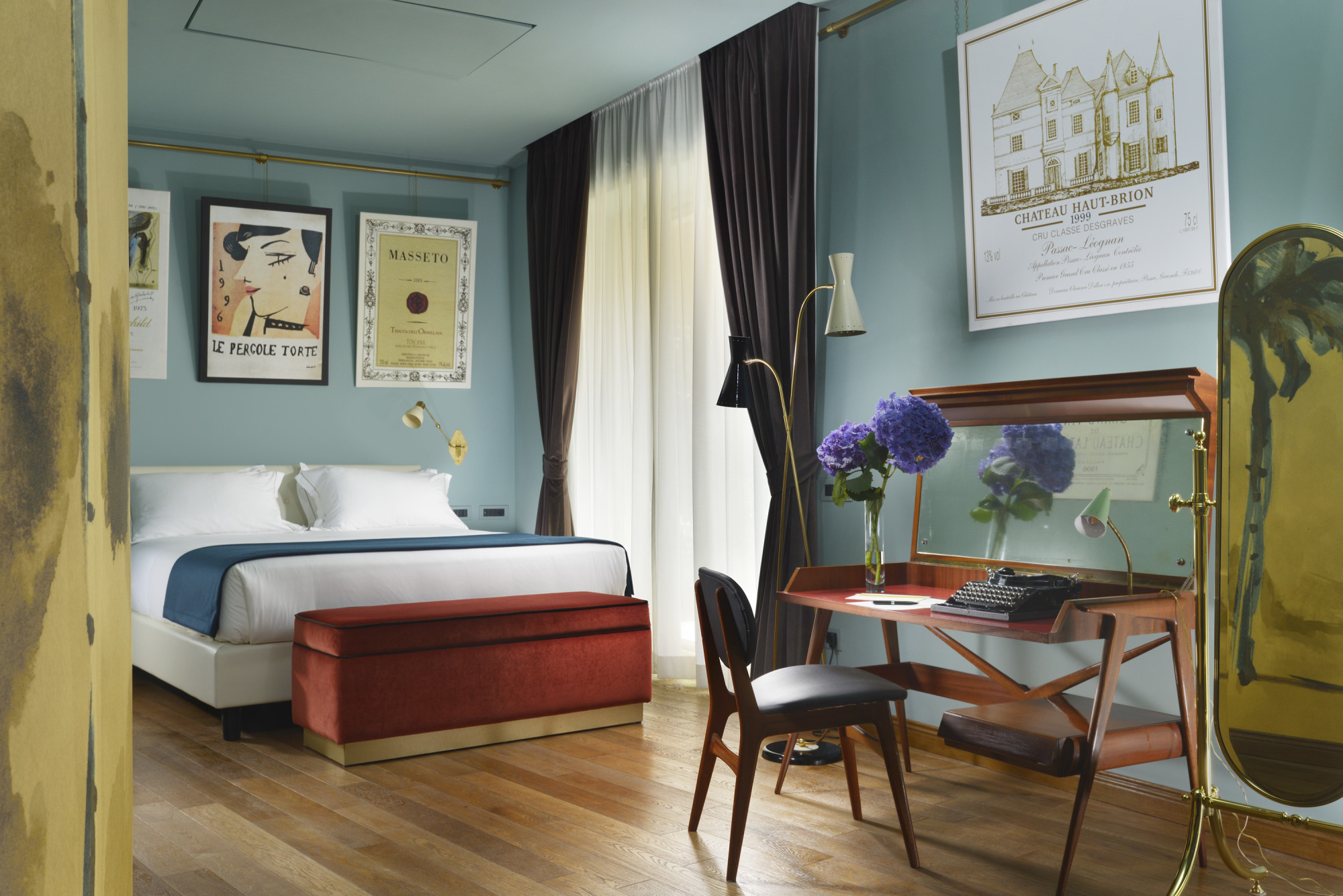
Image courtesy of Hotel De’ Ricci
Chapter Roma: A modern, stylish hotel in the central Regola district, blending whimsical design with a rooftop bar. Fora Reserve perks include a welcome drink and a complimentary upgrade whenever possible.
Hotel De' Ricci: A boutique hotel with a central location, known for its focus on personalized service and an impressive wine cellar. Fora Reserve perks include a 70€ food & beverage credit, daily breakfast, an upgrade and extended check-in/out whenever possible.
Palazzo Ripetta: A luxurious hotel housed in a former convent, offering a peaceful retreat with elegant interiors and a central location. Fora Reserve perks include a $100 food & beverage credit, daily breakfast, an upgrade and extended check-in/out whenever possible.
J.K. Place Roma: A sophisticated hotel near the Spanish Steps, known for its intimate atmosphere and chic, residential-style decor. Fora Reserve perks include a $100 food & beverage credit, daily breakfast, an upgrade and extended check-in/out whenever possible.
Hotel Vilòn is right next door to and actually shares a wall with J.K. Place Roma. This old-world gem has courtyard gardens and romantic rooms with private terraces. SLH withIN perks include a $100 food & beverage credit, daily breakfast, an upgrade and extended check-in/out whenever possible.
Hotel de Russie, A Rocco Forte Hotel: A prestigious hotel with lush gardens and a prime location near Piazza del Popolo, plus a rooftop and gorgeous courtyard. (And if you can’t find a room here, try its sister hotel, Hotel de La Ville.) Rocco Forte Knights perks include a $100 food & beverage credit, daily breakfast and an upgrade whenever possible.
Six Senses Rome: A wellness-focused hotel combining sustainable luxury with a prime location near the Pantheon and Trevi Fountain. Fora Perks include a $100 hotel credit, daily breakfast, an upgrade and extended check-in/out whenever possible.
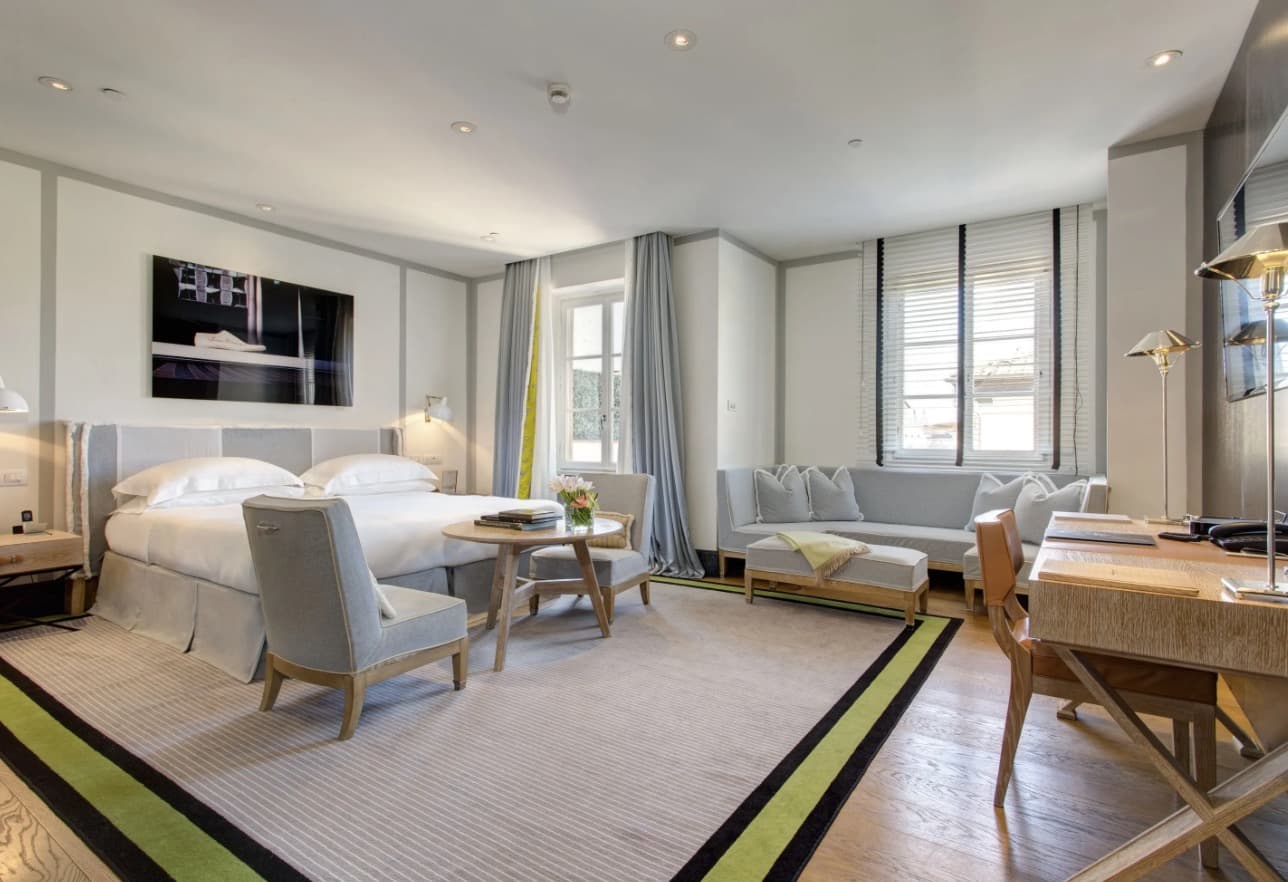
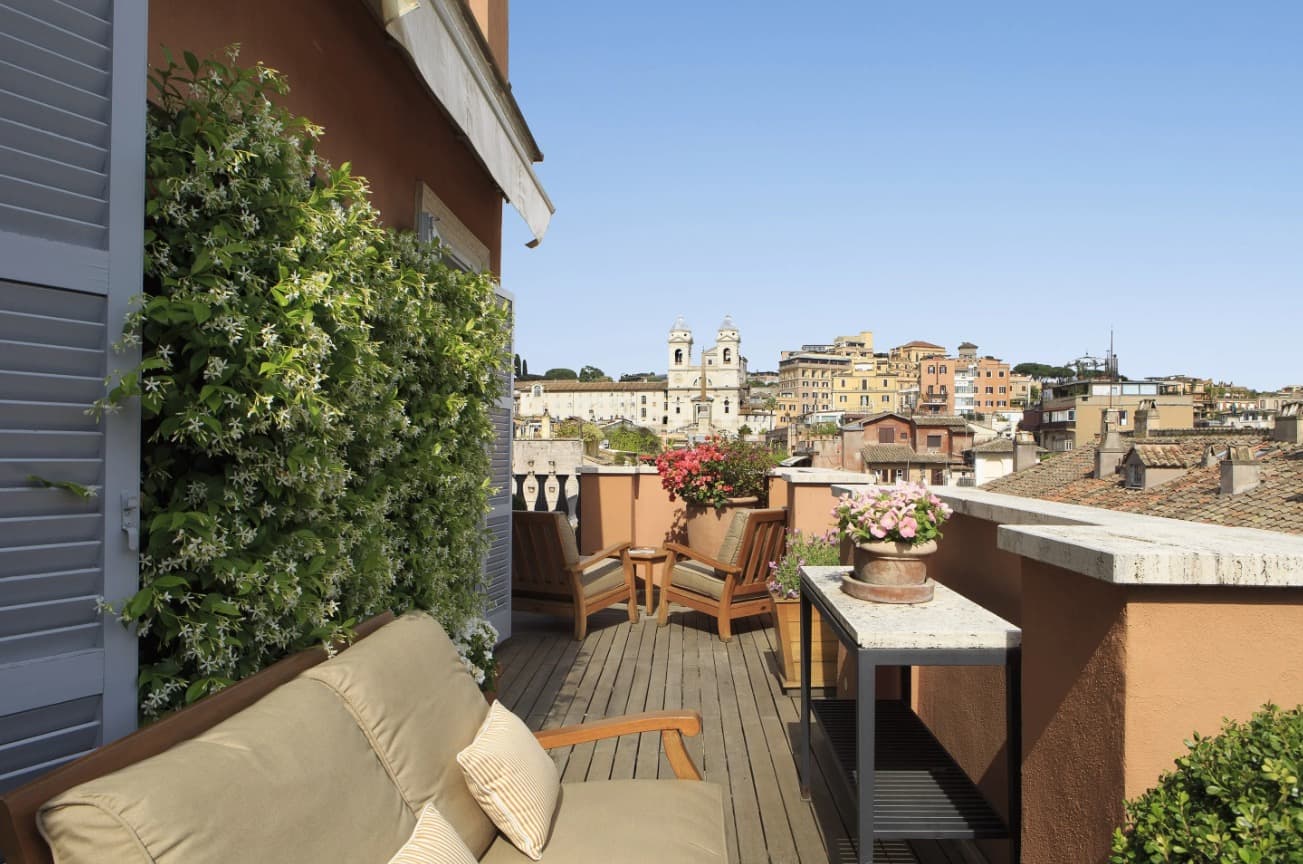


Images courtesy of Portrait Roma
Portrait Roma: An exclusive, all-suite hotel owned by the Ferragamo family offering personalized service and stunning rooftop views of the city, located steps from Via Condotti. Fora Reserve perks include a $100 food & beverage credit, daily breakfast, an upgrade and extended check-in/out whenever possible.
The Rome Edition: A stylish, modern hotel blending luxury with a contemporary vibe, positioned close to the historic center. Marriott STARS perks include a $100 food & beverage credit, daily breakfast, an upgrade and extended check-in/out whenever possible.
Elizabeth Unique Hotel: A sophisticated boutique hotel near Piazza del Popolo, known for its art-filled interiors and personalized service. Fora Reserve perks include a $25 hotel credit, daily breakfast, an upgrade and extended check-in/out whenever possible.
Casa Monti: A colorful, boutique hotel in the Monti district, perfect for travelers who enjoy staying in a local neighborhood with easy access to historic sites.
Hotel Eden: A luxurious hotel with stunning views over the city, known for its exceptional service and proximity to the Spanish Steps and Villa Borghese. Dorchester Diamond Club perks include a $100 hotel credit, daily breakfast and an upgrade whenever possible.
Sofitel Rome Villa Borghese: Next door to the Hotel Eden, this hotel is a blend of French elegance and Italian charm, offering a prime location near Villa Borghese and a great base for exploring the city. Accor Preferred by HERA perks include a $100 hotel credit, daily breakfast, an upgrade and extended check-in/out whenever possible.
History and culture
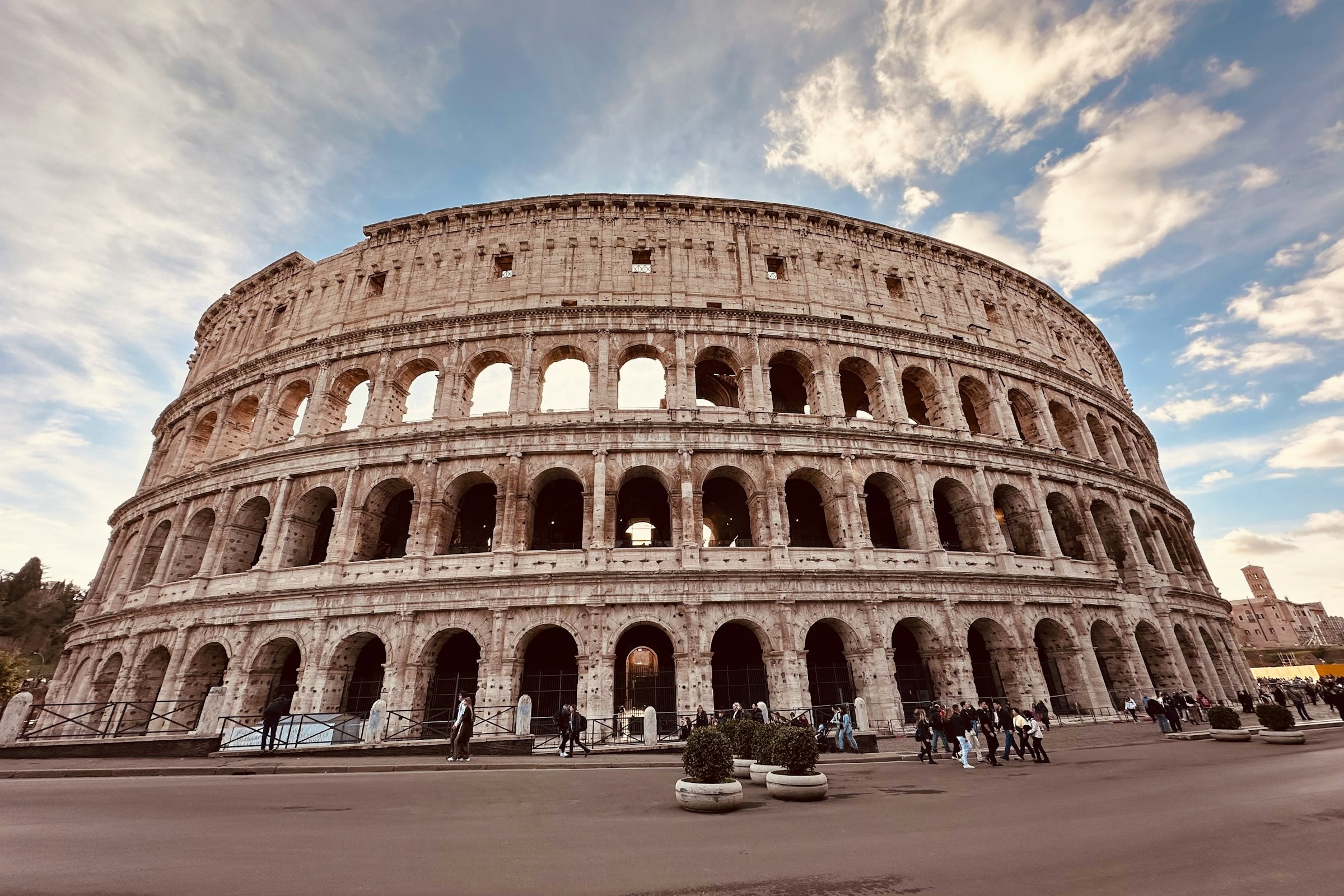
Rome's history begins over 2,700 years ago when it was founded on the banks of the Tiber River. Known as the Eternal City, Rome was once the center of the mighty Roman Empire, which shaped much of the modern world. Travelers are fascinated by the layers of history visible in the city's streets, where ancient ruins like the Colosseum and the Roman Forum sit alongside Renaissance masterpieces and Baroque fountains. These sites speak to Rome’s place in history as a center for innovation and world power.
Vatican City, the world's smallest independent state, is set on the western side of Rome and is the spiritual center of the Catholic Church, drawing millions of pilgrims each year. Cultural rituals such as La Pasquetta (Easter Monday picnics) and beliefs rooted in Catholicism play a significant role in daily life. The city’s landmarks, like St. Peter’s Basilica and the Pantheon, are not just tourist attractions but symbols of Rome's enduring spiritual legacy.
The influence of ancient Rome is still evident today in the city's architecture, language and even road networks. And while ancient traditions still hold sway, modern Roman culture is a dynamic blend of old and new.
Activities
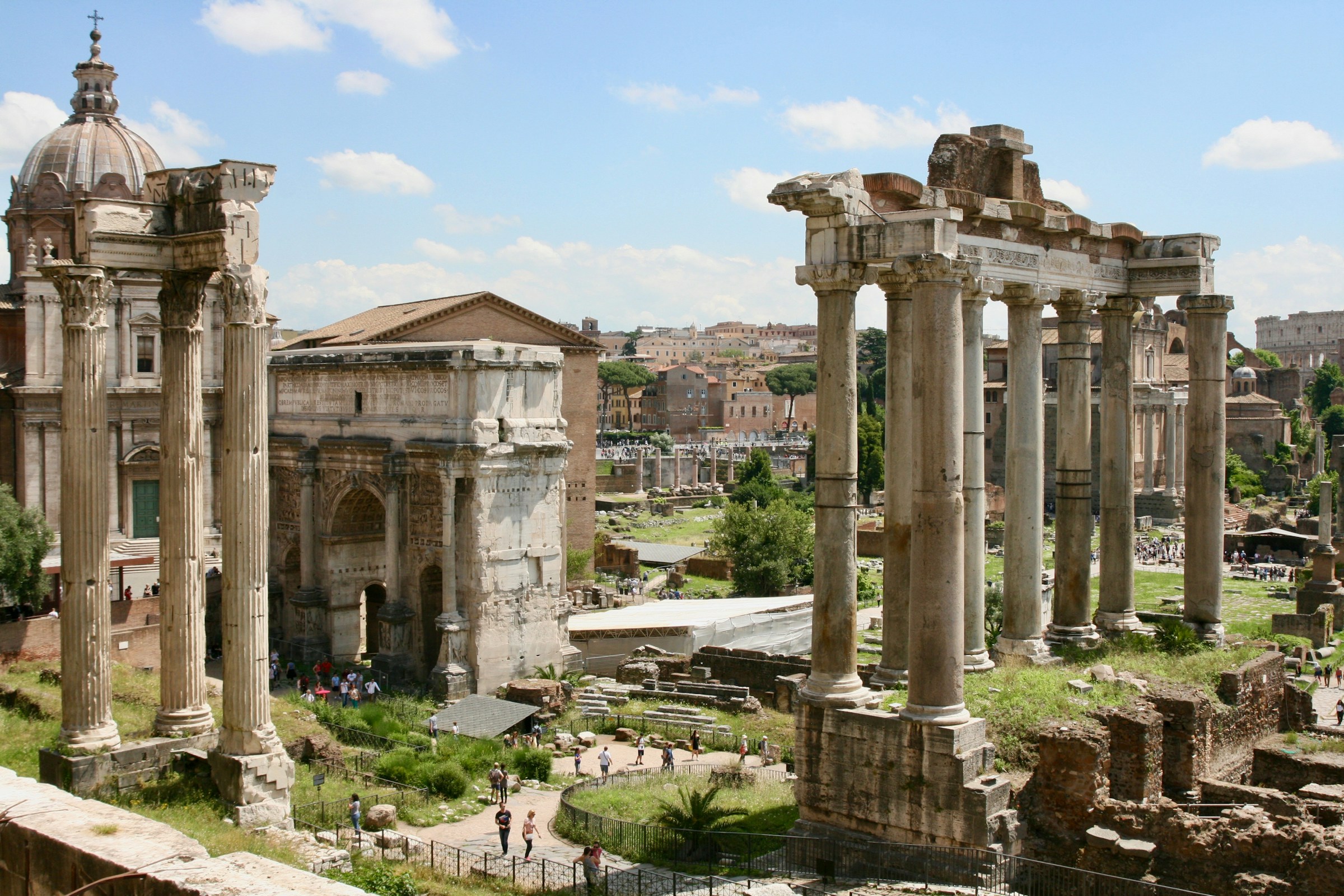
Take a Vespa tour to explore off-the-beaten-path areas like the Appian Way, or opt for a golf cart tour to cover more ground comfortably, especially in the heat of summer’s peak tourist season or for those with mobility limitations.
Toss a coin into the Trevi Fountain, one of Rome’s most famous landmarks, known for its stunning Baroque architecture. Legend has it that doing so ensures a return trip to the Eternal City.
Pair a tour of the impressive Colosseum with a stroll through the adjacent Roman Forum, once the center of ancient Rome’s public life and now filled with impressive ruins that date back thousands of years.
Right next to the Colosseum, visit the beautiful Basilica of San Clemente and its peaceful courtyard for a quieter, less crowded experience.
Visit the Spanish Steps, an ideal spot for enjoying panoramic views of the city and a perfect place to soak in the atmosphere of Rome's historic center.
Take a guided tour of Rome’s Jewish Ghetto, learning about the area’s history at key sites like the Great Synagogue and Portico d’Ottavia. Make sure to stop in at a local restaurant to enjoy traditional Roman-Jewish dishes like carciofi alla giudia.
Experience the Vatican with a private, early-morning tour of the expansive Museums, the Sistine Chapel and St. Peter's Basilica, avoiding crowds for a more enjoyable visit.
Don’t miss the masterpieces at Galleria Borghese, a mansion-turned-museum filled with exceptional pieces by Bernini, Caravaggio and Raphael. Insider tip: book an English-language tour with a museum guide ahead of time.
Explore Rome’s hidden art scene at lesser-known galleries like Galleria Lorcan O'Neill and Palazzo Doria Pamphilj, offering a mix of contemporary works and classic masterpieces without the usual crowds.
Foodies shouldn’t miss Testaccio Market, where they can purchase ready-to-eat fare or take-home goods. For another food experience, join a private cooking class with a local chef to learn how to prepare pastas and traditional Roman dishes.
Shopping in Rome is a mix of brand names and local boutiques. Head to Via del Corso and Via del Babuino to explore upscale shops, as well as the weekend Mercato Monti for local finds.
Add-on destinations
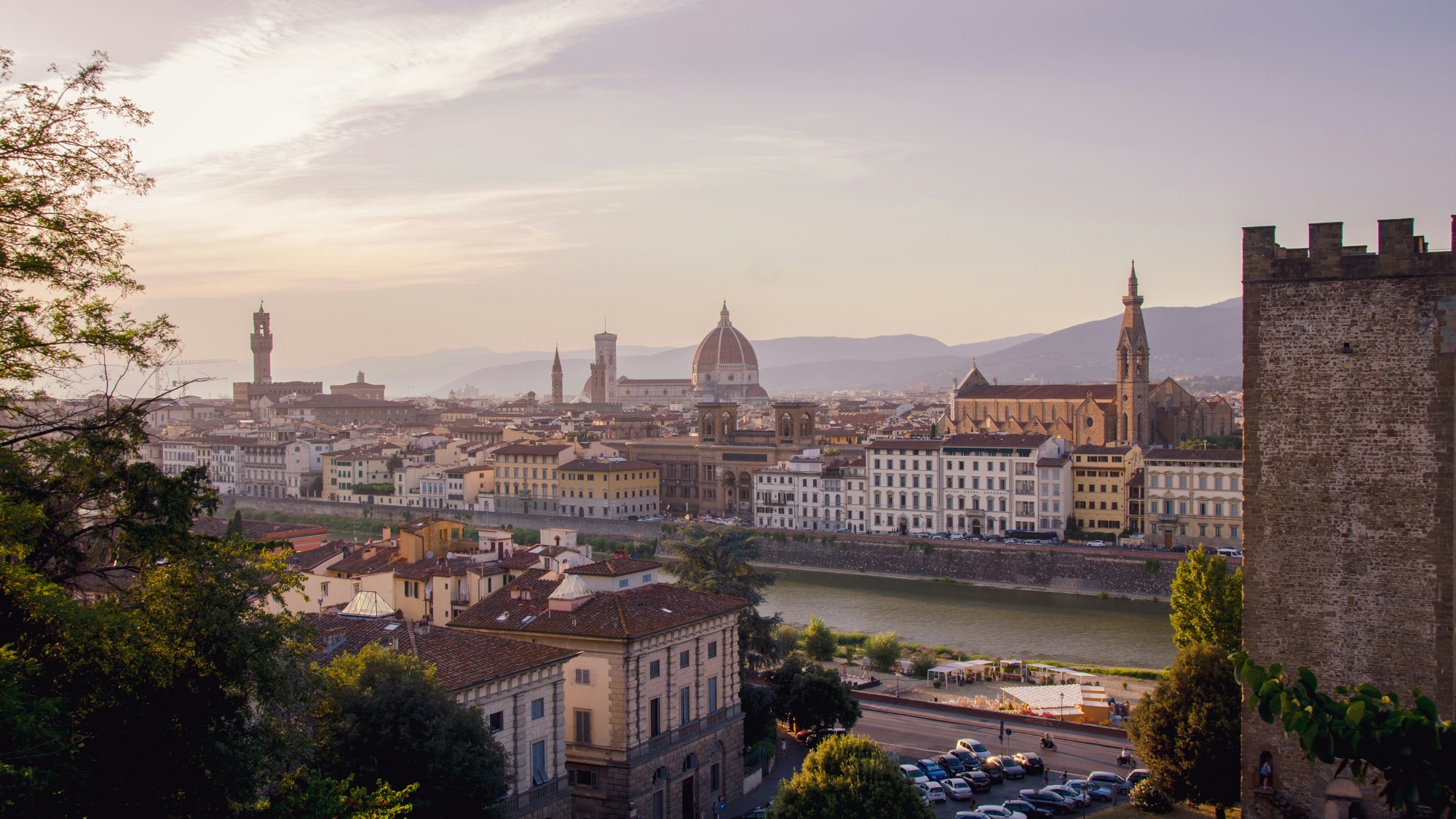
After the historic wonders of Rome, many travelers like to add on a different type of destination. Italy’s efficient and comfortable train system makes other cities and regions easily accessible, and these are a few spots that would make an ideal extension to a Rome trip.
Florence (1.5 hours by train): A visit to this Renaissance city allows you to explore its incredible art, architecture and history, including the iconic Duomo and Uffizi Gallery.
Venice (4 hours by train): Experience the romance and history of Venice, with its iconic canals, historic palaces and elegant palace hotels—an ideal extension for those seeking to explore another of Italy’s legendary cities.
Milan (3 hours by train): Combine your trip to Rome with a visit to Milan, Italy’s fashion capital, known for its historic sites like the Duomo, world-class shopping and vibrant cultural life.
Lake Como (4 hours by train): Experience the serene beauty of Lake Como, where you can explore charming villages, luxurious villas and enjoy boating or hiking in the stunning landscape.
Amalfi Coast (2 hours by train to Salerno): Extend your Italian adventure with a visit to the Amalfi Coast, renowned for its dramatic cliffs, charming coastal towns and breathtaking views of the Mediterranean.
To begin planning your trip to Italy, connect with me for expert advice and customized travel services.
